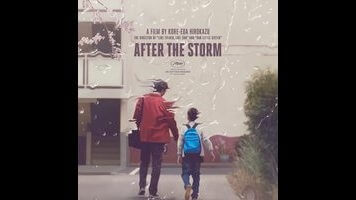Hirokazu Koreeda’s After The Storm is a breezy portrait of a sore loser

What’s worse than a failed novelist and deadbeat dad? How about a failed novelist and deadbeat dad who has been reduced to working for a sleazy detective agency, and blows every payday because he’s miserably addicted to betting on bicycle races? The Japanese writer-director Hirokazu Koreeda has set out to create something like the ultimate inveterate failure with Ryôta Shinoda (Hiroshi Abe), the central character of After The Storm. He is too vain to admit that his day job isn’t Method “research” for a book. When he isn’t rummaging around the home of his elderly mom, Yoshiko (Kirin Kiki), for knickknacks to pawn, he spies on his son’s Little League games through binoculars. Every night, he stumbles into a crappy apartment of a uniquely Japanese variety—the kind so small that it (and, by extension, a character’s entire pathetic life) can fit into a single master shot. His late father was the same type of scoundrel, having left little to his son apart from pawn tickets for Ryota’s own childhood belongings. But, as everyone is quick to point out, at least he was a better liar.
It’s one thing to realize that you’re reliving a parent’s mistakes, another to be told that you’re not even good at it. Koreeda, best known for the likes of Still Walking (which also starred Kiki and Abe as a mother and son) and Nobody Knows, applies his genial touch to this apparent antihero; he sounds like a scumbag but is treated like an affable loser. Regardless of the drama implied by the title—or the perverse enjoyment that the filmmaker seems to get out of introducing Ryota’s shortcomings—After The Storm is an exercise in mellowness, right down to the snatches of tinkly-twinkly sentimental music. Thankfully, Koreeda has stopped randomly moving the camera, as he did in last year’s Our Little Sister; it remains still much of time, a mode that better suits his placid and unassuming point of view. The families he depicts in his films are never perfect. Ryota’s certainly isn’t: He’s semi-estranged from his sister, Chinatsu (Satomi Kobayashi), and owes his ex-wife, Kyôko (Yôko Maki), too much in child support to visit their son, Shingo (Taiyô Yoshizawa). But Koreeda is deeply fond of his characters, and he never tires of letting them find measures of bliss in small things and compromises.
The structure of After The Storm approximates two episodes of TV, with a first half that’s built like a pilot, and a second like a draggy bottle episode, with the primary cast holed up in Yoshiko’s apartment during a typhoon. One can’t help but think that this opening hour is more memorable; its plays Koreeda’s mildness and resistance to external conflict against his jealous protagonist, who seems to catch break after break only to screw up again. (It also helps that Ryota’s boss is played by the character actor Lily Franky, always a welcome presence in Koreeda’s films.) This is the sort of domestic drama where characters are redeemed not by big, life-changing gestures, but by the nuggets of wisdom that they manage to derive from their lives. Yet there’s nothing there to be said that isn’t implicit in the first half and its forays into the trappings of noir. Ryota is defined by ironies: He’s trying to escape his life, though his only novel, which won him a literary prize many years ago, was transparently autobiographical; he tails cheating spouses for a living but can’t figure out why his own marriage fell apart; he suspects Chinatsu of sponging off their mom’s pension money, though he is trying to do the same. And every time Yoshiko helps him out or his patient sidekick Machida (Sôsuke Ikematsu) spots him some money for a bet, only to see him lose, After The Storm makes the same simple point: Life is what you make of it. It’s not a bad message, but not a deep one either.